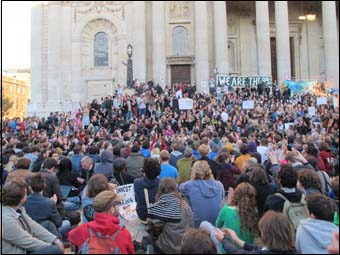Welcome to DU!
The truly grassroots left-of-center political community where regular people, not algorithms, drive the discussions and set the standards.
Join the community:
Create a free account
Support DU (and get rid of ads!):
Become a Star Member
Latest Breaking News
General Discussion
The DU Lounge
All Forums
Issue Forums
Culture Forums
Alliance Forums
Region Forums
Support Forums
Help & Search
Religion
Related: About this forumGiles Fraser: Going for Brokenness {good read}
http://dissentmagazine.org/online.php?id=595
It took a little over two hours to clear the tents from around St. Paul’s Cathedral in London one night at the end of February. By lunchtime the following day, behind tall metal fences, flagstones were being scoured with high-pressure hoses as “order” was finally restored. After four months, the London Occupiers may have been evicted, but according to former St. Paul’s canon chancellor Giles Fraser, “You cannot evict an idea.” Fraser resigned last October when St. Paul’s had, he feared, “chosen a path that might well issue in violence against peaceful protesters.”
The nationwide soul-searching triggered by the camp was, as elsewhere, about money, and about how meaningful political struggle might now work. But it was also, and from the start, about institutional religion and violence, a topic never far from Fraser’s mind. Amid all of the headlines and the excitement, there was a longer story about his resignation that went untold at the time.
Fraser’s willingness to intervene personally in such controversies may have been news, but it was not new. Before St. Paul’s he was the vicar of St Mary’s Putney—about five miles west along the river from central London. It was here that he welcomed Gene Robinson, the Bishop of New Hampshire and the first openly gay bishop in the Anglican Communion, when Robinson was denied access to the church’s Lambeth Conference. If you turn up at St Mary’s Putney on a mid-week evening, you’ll find a café run by volunteers, an Alcoholics Anonymous meeting, and a local orchestra rehearsing. You’ll also find a permanent exhibition installed on the occasion of a meeting of politicians, historians, lawyers, and theologians held during Fraser’s time here to discuss the state of British democracy. That exhibition tells the story of the Putney Debates, which took place at St Mary’s in 1647. The Levellers, a group of radical pamphleteers (or freelance journalists), met here with Oliver Cromwell and other generals of the victorious New Model Army. They had already campaigned for the abolition of the big trading and professional monopolies. Now they presented Cromwell with An Agreement of the People, setting out a vision of universal adult male suffrage, religious tolerance and freedom of expression, and equality before the law. Sovereignty was to reside fundamentally in the people. The extent to which it did then, and does now, was the theme of the 2007 event.
Fraser is no stranger to the ways in which sacred place and radical politics can coincide and reinforce one another. If he is trendy this is trendiness with a seventeenth century pedigree—indeed, he would argue that it can be traced back at least seventeen centuries further than that. The same year of the 2007 meeting he collaborated with the literary critic Terry Eagleton on The Gospels (Verso), exploring them as revolutionary documents. Late this winter, before he returned to parish work in inner-city London, he was working with the editorial writer at the Guardian. We met outside a café around the corner from their offices on a raw February morning. At a table next to the thundering traffic, opposite the grimy brickwork of a mainline railway station, he smoked several cigarettes and talked Aquinas and Luther.
InfoView thread info, including edit history
TrashPut this thread in your Trash Can (My DU » Trash Can)
BookmarkAdd this thread to your Bookmarks (My DU » Bookmarks)
0 replies, 627 views
ShareGet links to this post and/or share on social media
AlertAlert this post for a rule violation
PowersThere are no powers you can use on this post
EditCannot edit other people's posts
ReplyReply to this post
EditCannot edit other people's posts
Rec (3)
ReplyReply to this post